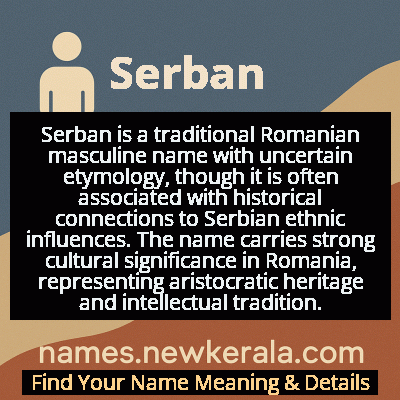Serban Name Meaning & Details
Origin, Popularity, Numerology Analysis & Name Meaning of Serban
Discover the origin, meaning, and cultural significance of the name SERBAN. Delve into its historical roots and explore the lasting impact it has had on communities and traditions.
Name
Serban
Gender
Male
Origin
Romanian
Lucky Number
5
Meaning of the Name - Serban
Serban is a traditional Romanian masculine name with uncertain etymology, though it is often associated with historical connections to Serbian ethnic influences. The name carries strong cultural significance in Romania, representing aristocratic heritage and intellectual tradition.
Serban - Complete Numerology Analysis
Your Numerology Number
Based on Pythagorean Numerology System
Ruling Planet
Mercury
Positive Nature
Adventurous, dynamic, curious, and social.
Negative Traits
Restless, impatient, inconsistent, prone to indulgence.
Lucky Colours
Green, white.
Lucky Days
Wednesday.
Lucky Stones
Emerald.
Harmony Numbers
1, 3, 9.
Best Suited Professions
Sales, marketing, travel, entertainment.
What People Like About You
Versatility, charisma, adventurous spirit.
Famous People Named Serban
Șerban Cioculescu
Literary Critic and Historian
Renowned Romanian literary critic and essayist, member of the Romanian Academy
Șerban Cantacuzino
Architect and Historian
Prominent Romanian architect and architectural historian, known for heritage conservation
Șerban Huidu
Actor
Award-winning Romanian theater and film actor
Șerban Marinescu
Film Director
Romanian film director and screenwriter known for social realism
Name Variations & International Equivalents
Click on blue names to explore their detailed meanings. Gray names with will be available soon.
Cultural & Historical Significance
In Romanian cultural consciousness, Șerban evokes images of educated nobility, diplomatic skill, and artistic appreciation. The name appears frequently in historical literature, folk traditions, and academic circles, maintaining its prestige across centuries. It symbolizes the intellectual and aristocratic elite who guided Romanian society through turbulent historical periods while preserving cultural heritage. Even in modern times, the name carries connotations of sophistication, historical awareness, and connection to Romania's complex past, serving as a living link between contemporary Romanians and their rich historical legacy.
Extended Personality Analysis
Individuals named Șerban are typically perceived as possessing a distinctive blend of intellectual depth, cultural sophistication, and quiet authority. They often exhibit natural leadership qualities combined with a reflective, analytical approach to life's challenges. Șerbans are generally seen as reliable and principled individuals who value tradition while remaining open to progressive ideas. Their personality tends toward thoughtful consideration rather than impulsive action, making them excellent strategists and problem-solvers in both professional and personal contexts.
Socially, Șerbans are known for their loyalty and deep commitment to family and cultural roots. They often demonstrate strong artistic or academic inclinations, with many excelling in fields requiring historical perspective or creative expression. While they may appear reserved initially, Șerbans typically possess warm, engaging personalities that emerge in trusted circles. They value meaningful relationships over superficial connections and are often sought as advisors due to their balanced judgment and cultural wisdom. The name suggests someone who carries themselves with dignity while maintaining genuine humility and respect for others.
Modern Usage & Popularity
In contemporary Romania, the name Șerban maintains a distinctive presence as a choice that balances historical prestige with modern accessibility. While not among the top-ranking popular names, it enjoys consistent usage particularly among families with strong cultural awareness or historical connections. The name has experienced a mild resurgence in recent decades as Romanians increasingly value names that reflect national heritage and aristocratic traditions. It's most commonly found in urban centers and among educated families who appreciate its cultural depth and distinguished sound. The diacritical form 'Șerban' remains preferred in Romania, while the simplified 'Serban' version is used internationally or in digital contexts where special characters pose challenges. Modern parents choosing this name often seek to honor family traditions while providing their children with a name that conveys sophistication and cultural rootedness.
Symbolic & Spiritual Meanings
Symbolically, the name Șerban represents the enduring connection between past and present, embodying cultural continuity and intellectual heritage. It evokes metaphors of the wise steward who preserves tradition while navigating contemporary challenges. The name suggests a bridge between generations—carrying forward the wisdom of ancestors while engaging with modern realities. In symbolic terms, Șerban represents the cultivated mind that appreciates both artistic beauty and historical truth, serving as a guardian of cultural memory. The name also symbolizes aristocratic responsibility without pretension, suggesting someone who carries historical weight with grace and uses inherited wisdom for the benefit of their community. It represents the ideal of educated leadership that respects tradition while embracing progress.

